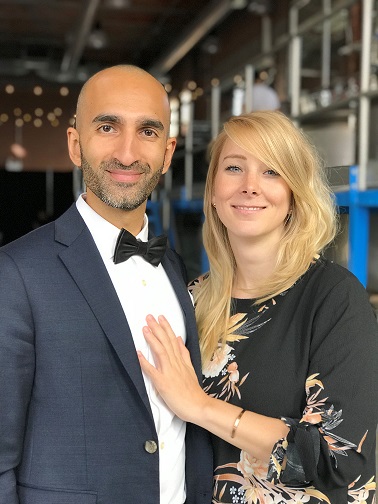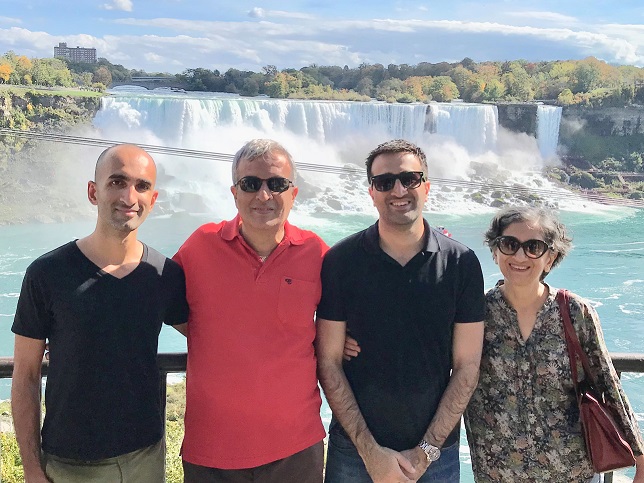The Power of Gratitude
By Vir C Advani
Beechwood District, Ottawa

On July 15, 2018, I was returning to Toronto when I felt a dull pain in my lower back. The pain got worse with each passing day, but my doctor informed me that test results showed nothing wrong with my back. This was the beginning of a two-and-a-half-year journey of suffering and despair.
Rewind to July 2017—I had recently completed my MBA at Queen’s University and was the class valedictorian. Shortly thereafter, I was approached by a recruiter and offered a top job at Canada’s largest bank. Later I discovered that over 1,000 candidates had applied for that job and only five were selected. Mystically, I was the only one who had been invited to interview without even applying! My wife and I subsequently moved to Toronto. She was able to get a job almost immediately, and things were looking good.
I enjoyed my job, but the hours were long, and the work was stressful because I was in a competitive two-year leadership training program. Sometimes I would be in the office for 12 to 14 hours a day, for weeks on end. In my spare time, I volunteered at the SGI Canada Culture Centre in Toronto, and I attended meetings whenever I could. Despite my hectic schedule, I continued to push myself to exercise and eat well, but it wasn’t enough. A few months into my new job, I developed insomnia. I was sleeping only four to five hours a night, and sometimes less. I began to skip morning and evening gongyo,[1] trying to squeeze in an extra 15 minutes of sleep, sometimes because I had been out late with work colleagues. The chanting I did was dull and lacklustre. My job became the centre of my life, and I was so eager to perform well that I neglected my practice. However, I was still under the impression that I was on the right track, despite the deterioration in my physical and mental health. As I exerted myself more and more in my career, my health got worse and worse, to the point where my chronic back pain took over my life.
Words cannot describe the emotional toll that chronic pain takes on a person. I went from working out five times a week to barely being able to get out of bed some days. I couldn’t sit, lie down, or stand without feeling pain. One morning, I was unable to lift my infant son because I was in too much pain. Worse still was the emotional pain. I became withdrawn from the rest of the world, and even though I put on a brave face in public, deep down I felt completely hopeless and depressed. I began to develop anxiety, and my insomnia got even worse. Frequently I would lie in bed awake all night worrying about what life had in store for me. I’d sleep for one to two hours, then wake up and get ready to catch the 5:30 a.m. train to work, returning home at around 7:00 p.m. with just enough time to say good night to my son and tuck him in. I would then get started on whatever kind of therapy I was trying at the time (believe me, I tried everything!) and then I would get into bed for another sleepless night. This cycle lasted a long time. I was getting sick and having to miss work often. Some days I would simply call in sick because I couldn’t get out of bed. I was too embarrassed, or perhaps too proud to admit to my employer that I was going through a difficult time. All they knew about me was that I was a high performer at work, and so I felt ashamed to tell them that I was struggling. They even promoted me to a more senior role, which was a surprise, but that did nothing to ease my suffering. In fact, I was even more miserable because I had to take on a lot more responsibility than before. Most people would be grateful for a promotion, but my low life condition didn’t allow me to be happy.
Throughout this time, I was still attending SGI meetings and chanting, but my faith was weak, and my practice felt like a chore. By December 2019, I had reached a breaking point. I told my wife that I was no longer interested in staying in my job, and that I wanted to move back to Ottawa, where we had most of our family and friends. I wanted a change of pace and a chance to spend quality time with my son. She agreed. She had seen me deteriorate, and she too was struggling as a new mother with limited support from her partner. I let my manager know that I was going to be looking for new opportunities in Ottawa. I came clean with him, telling him everything that had happened to me. He was surprised and disappointed, but ultimately, he understood that I needed to do this for my peace of mind and for my family. He asked me to stay until I was able to find a role in Ottawa, and I agreed. I left his office feeling a glimmer of hope for the first time in a while. Being honest about my situation, and prioritizing my needs over my employer's felt liberating, like I was turning the corner… and then COVID-19 happened.
The job prospects I had been pursuing in Ottawa all vanished. My financial portfolio, intended for a down payment on our future home, was decimated. Our plan to relocate was turned on its head and we were stuck. I could have felt sorry for myself, but by this point, my life condition was starting to change. It helped that all along I had been having weekly phone calls of encouragement with my parents. My mother had joined SGI in India before I was born, and my father is also a long-time, dedicated member. However, the real turning point happened when I read something that made me realize that my practice and my SGI activities for kosen-rufu[2] were not a chore but rather a privilege and a source of benefit. Instead of begrudging my efforts, I became proactive in activities, and I said “yes” to everything I was asked to do.

“It became clear to me that all my anxieties were rooted in my negative attitude. I made a vow to never again feel sorry for myself, and instead, to have a ‘heart of gratitude.’” Above: From left: Vir, Kailash (father), Rahul (brother) and Anjolie (mother).
Soon, instead of feeling discouraged, I had a completely different perspective. I was fortunate to still have a job, without a lengthy commute to work. I could cook meals at home and eat healthier. I got to spend more time with my family, especially my son. I was saving more money than ever before. I was exercising regularly and sleeping more. I became more confident in my job, and interestingly, my back pain wasn’t as severe.
During this time, I reflected a lot on the concept of the oneness of life and its environment—the influence that your inner life condition has on your outer world. It became clear to me that all my anxieties were rooted in my negative attitude. I made a vow to never again feel sorry for myself, and instead to have a “heart of gratitude.” My faith became strong again. I was chanting joyously with the roar of a lion. It felt as if the entire universe had changed its course to support me. And this was only the beginning of a series of benefits beyond my wildest dreams.
Three months after the pandemic began, my manager agreed to relocate me to Ottawa, where I could continue in my senior role. He even gave me a raise and commended me for the good work I was doing. Soon, my investment portfolio was almost 50 per cent higher than before the pandemic. Within days of arriving in Ottawa, we were able to get our son into a great daycare which usually has a one-year waitlist. In the midst of the tightest real estate market in Canadian history, we were able to find the perfect house, for less than asking.
My relationship with my family has improved, and for the first time since my son was born, I feel confident as a parent. I am energetic and enthusiastic about life again. I am exerting myself more now than ever before. I joined the board of directors of my son’s school, and I started a side business. In addition, I rolled up my sleeves to renovate our new home, as well as putting my best foot forward for SGI. And I am finally pain-free!
Going through this struggle taught me something—it’s easy not to feel blessed. Human beings have a stronger tendency to see what we don’t have than what we do. We see people who have more, and consequently we feel deprived. And while we are feeling sorry for ourselves, we’re not noticing that the people who have more are focusing on what they don’t have, too. The practice of Nichiren Buddhism has enabled me to break this continuous cycle of negative thinking. It has shown me that you can literally alter the universe, simply by altering your life condition. I have found that by strengthening my vow to always have a heart of gratitude, I have unlocked my innermost potential. The tremendous benefits that I have received are the effect of chanting with this vow in my heart, and I suspect that this is only the tip of the iceberg.
I’d like to end with a simple quote from SGI President Daisaku Ikeda:
There is no one as strong as a person whose heart is always filled with gratitude.[3]
Published in November 2021 New Century
[1] Gongyo: In Nichiren's (1222-1282) teaching, gongyo means to chant the daimoku of Nam-myoho-renge-kyo and recite portions of the “Expedient Means” (second) chapter and the “Life Span” (sixteenth) chapter of the Lotus Sutra with faith in the object of devotion called the Gohonzon.
[2] Kosen-rufu: Literally, it means “to widely declare and spread [the Lotus Sutra]”; to secure lasting peace and happiness for all humankind through the propagation of Nichiren Buddhism. More broadly, kosen-rufu refers to the process of establishing the humanistic ideals of Nichiren Buddhism in society.
[3] https://www.daisakuikeda.org/sub/quotations/theme/gratitude.html

